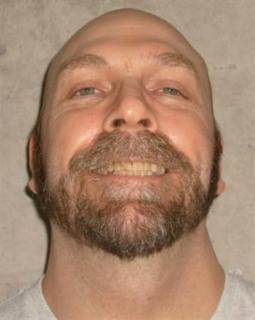Oklahoma executes murderer in first 2012 execution
 2012-01-06 Reuters
2012-01-06 Reuters
By Steve Olafson
A convicted murderer who tried but failed to kill himself three weeks ago in prison was put to death by lethal injection on Thursday in Oklahoma in the country's first execution of 2012.
Gary Roland Welch, sentenced to death for the fatal stabbing of Robert Dean Hardcastle during a drug dispute in 1994, was declared dead at 6:10 p.m. on Thursday at the state prison in McAlester, prison spokesman Jerry Massie said.
Welch was the first U.S. inmate executed this year, and the first in Oklahoma since January 2011, according to the Washington-based Death Penalty Information Center, which tracks death penalty data. He was 49 years old.
Welch acknowledged "my brothers" in prison before his execution and said: "So let's get it on because that's what we're here for," Massie said, quoting execution witnesses.
Welch then repeated four times, "Valhalla, Odin, slay the beast," Massie said.
Odin is the chief god in Norse mythology and Valhalla is the hall in which he receives slain heroes.
Welch attempted unsuccessfully to kill himself three weeks ago by slashing his neck, according to prison officials.
Earlier in the day, Welch requested his last meal be two fish filets from Long John Silver's, Massie said.
A tattoo artist and admitted methamphetamine user, Welch said he killed Hardcastle, 35, in self defense after he went to the man's duplex in Miami, Oklahoma, to barter for drugs and was unexpectedly attacked.
He told the Oklahoma Pardon and Parole Board he would not apologize for killing Hardcastle because the other man initiated the violence.
"To me, this was life or death. It was just luck that I survived," Welch said. "My intentions were never to kill him. But I also didn't intend for him to kill me either."
But multiple witnesses said Welch punched and stabbed Hardcastle before slashing him with a broken beer bottle, Oklahoma Attorney General Scott Pruitt said.
"Gary Welch had a 15-year history of violent crimes that included multiple assaults on women and police officers, burglary, stabbings and carrying concealed weapons before his conviction for murder," Pruitt said.
"The punishment of death as chosen by a jury of Welch's peers is reserved for the most heinous crimes. My thoughts are with Robert Hardcastle's family and what they have endured for the past 17 years," he added.
The Oklahoma Pardon and Parole Board narrowly denied clemency to Welch by a 3-2 vote. Welch had said during the hearing he would not apologize for killing Hardcastle because the other man initiated the fight.
A co-defendant of Welch's, Claudie Conover, was also convicted and sentenced to death although his sentence was later reduced to life without parole. Conover died of natural causes in 2001.
Oklahoma executed two prisoners in 2011, both in the first two weeks of the year, according to DPIC data. The execution brings to 1,278 the number of people executed in the United States since capital punishment was reinstated in 1976.
The number of U.S. executions fell for the second year in a row in 2011, with 43 inmates put to death compared to 46 in 2010 and 52 in 2009, DPIC figures show.
That is fewer than half of the number of executions a dozen years before, in 1999, when a record 98 prisoners were executed.
(Editing by Dan Burns and Cynthia Johnston)


